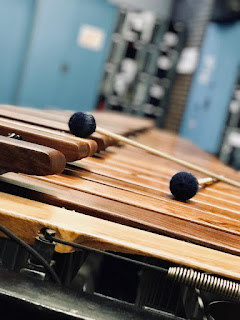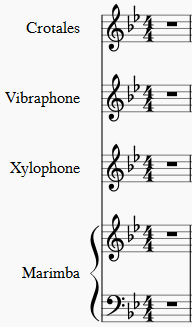Week Two
Hello again! It has been about a week since my last post and I am so excited to tell you that I have already made so much progress with my project.
Since then, I have been using the Finale software to compose my music. I go into the band room during extra help, my lunch periods, and study halls to work on the composition. Today, while I was composing and thinking about what I should write about for my next blog, a thought popped into my head. Some of you may know about music and how all of it comes together to make what we hear on the radio or at concerts. However, a majority of you may not know anything about the process. So, I'm going to tell you what goes on in a composers head and try to relate it to a common skill we all have.
Composing music is very much like writing an essay, story, novel, poem, etc.. We start out with a planning page so we can map things out. After that, we hit the computers, or if we were in early days, the classic pen and manuscript paper. We lay out the foundation (this is like your thesis statement, tells the listener what is going on and it carries on throughout the whole song) and then we start adding the main melody and finally, some harmonies to make it sound complete and pretty. Now, just like any writer, there tends to be a countless amount of scrap pieces and millions of revisions. Interestingly enough, there are a countless amount of rules to follow while composing, just like writing. However, once you find your style and get your bearings, you can start to "break" these rules in order to create really cool affects. Many, if not all composers usually have a distinctive thing that allows you to pick them out by ear... This usually comes from rule breaking. Finally, when the composer feels satisfied with their work, they add the final touches. This includes things like how loud or soft parts are, the style in which the music is played with, how fast or slow sections are, and all of the other cool stuff that makes music, music. Though stressful at times, the end result is worth everything.
I have completed 16 measures for each of the 5 instruments in my ensemble, which in total, is 80 measures. I really can't wait to write more and more and see the whole thing come together.
As per my previous post, part of this project is teaching. I did some research and found this amazing app, Tonara. This app lets me act as the teacher by having me add students, assigning certain things to practice and it also allows them to record and send audio of their practice session. I'm very excited to be able to enter that phase of the project later down the road.
Feel free to comment bellow if you have any questions or just want to talk!
Since then, I have been using the Finale software to compose my music. I go into the band room during extra help, my lunch periods, and study halls to work on the composition. Today, while I was composing and thinking about what I should write about for my next blog, a thought popped into my head. Some of you may know about music and how all of it comes together to make what we hear on the radio or at concerts. However, a majority of you may not know anything about the process. So, I'm going to tell you what goes on in a composers head and try to relate it to a common skill we all have.
Composing music is very much like writing an essay, story, novel, poem, etc.. We start out with a planning page so we can map things out. After that, we hit the computers, or if we were in early days, the classic pen and manuscript paper. We lay out the foundation (this is like your thesis statement, tells the listener what is going on and it carries on throughout the whole song) and then we start adding the main melody and finally, some harmonies to make it sound complete and pretty. Now, just like any writer, there tends to be a countless amount of scrap pieces and millions of revisions. Interestingly enough, there are a countless amount of rules to follow while composing, just like writing. However, once you find your style and get your bearings, you can start to "break" these rules in order to create really cool affects. Many, if not all composers usually have a distinctive thing that allows you to pick them out by ear... This usually comes from rule breaking. Finally, when the composer feels satisfied with their work, they add the final touches. This includes things like how loud or soft parts are, the style in which the music is played with, how fast or slow sections are, and all of the other cool stuff that makes music, music. Though stressful at times, the end result is worth everything.
I have completed 16 measures for each of the 5 instruments in my ensemble, which in total, is 80 measures. I really can't wait to write more and more and see the whole thing come together.
As per my previous post, part of this project is teaching. I did some research and found this amazing app, Tonara. This app lets me act as the teacher by having me add students, assigning certain things to practice and it also allows them to record and send audio of their practice session. I'm very excited to be able to enter that phase of the project later down the road.
Feel free to comment bellow if you have any questions or just want to talk!



Wow, Levi! You’ve made much progress since I last spoke with you on the 29th. Finale is a great software:) And 80 measures is quite a success! Keep up the work!!!!
ReplyDeleteHi Levi!
ReplyDeleteHow is your project coming along? I’m hoping that it’s going well!!!
Dr. Reed
Yes! This project is exceeding my expectations everyday! I have two new blogs posted :)
Delete